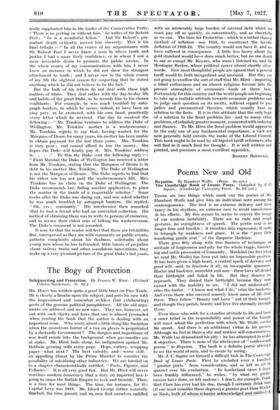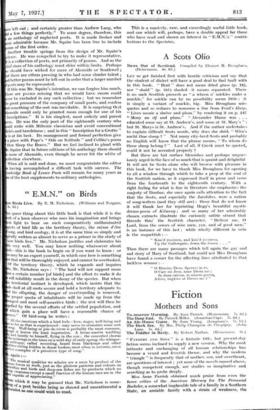Poems New and Old
Requiem. By Humbert Wolfe. (Benn. 6s. net.) THERE are two things which mark out the poems of Mr. Humbert Wolfe and give him an individual note among his contemporaries. The first is an extreme delicacy and hesi- tancy in his rhythms, an extreme care to avoid massiveness in his effects. By this means he seems to convey the image of our modern instability. There are no rude and rough gestures, no outrightness of speech. The poetic soul is no longer firm and forcible ; it trembles into expression, it seekq to triumph by weakness and grace. It is the " poor little wandering gentle soul ". of the Emperor Hadrian.
There goes fitly along with this fineness of technique an attitude of forgiveness and pity for the whole tragic, blunder- ing and noble procession of humanity. Mankind (we feel when we read Mr. Wolfe) has been put into an impossible position. It has been given a high heart, a central spark of decency and good will—and, to frhstrate it all, an inescapable ignorance, Harlot and huckster, anarchist and nun—these have all denied, their birthright and failed in life. But they -deserve no reproach. They denied their birthright because they were cursed with the inability to see. " I did not understand," cries the harlot. " I know not what I -do," cries the huckster. And even those who succeed scarcely know more of life than these. They follow " Beauty and Love " out of their hungeri and though they perish, beauty and love live eternally through
them.
Even those who wish for a steadier attitude to life and have a surer belief in the responsibility and power of the human Will must admit the perfection with which Mr. Wolfe carries his mood. And there is an additional virtue in his poems. Although we feel in them a shy and restless self-consciousness, Mr. Wolfe has dramatized his pity he has attempted to make it objective. There is none of the irreticence of " confessional poems " in Requiem. The book is a definite poetic attempt
to see the world of men, and to create by seeing. Mr. J. C. Squire set himself a difficult task in The Cambridge
Book of Lesser Poets. First he excluded over a hundred " greater poets " from consideration, and so left us all to quarrel over his evaluation. ".In borderland cases I have. been frankly influenced," he writes, " by what my prede- cessors have done, or left unrkine : I don't, for example, think that Clare has ever had his due, though I certainly think him
(if one must considei these degrees) a greater poet than Waller
DI- - qr--N1481.1/-13(!th.-PLF11.911L‘elasieS,PARq. Wledked 814 rt0g=`- ve-left out ; and certainly greater than Andrew Lang, who d a few things perfectly." To sonic degree, therefore, this an anthology of neglected poets. It is made fresher and ore admirable because Mr. Squire has been free to include ems of the first order.
Another trouble springs from the design of Mr. Squire's ohne. He was compelled to try to make it representative. is a collection of poets, not primarily of poems. And so the hief stars of his anthology must shine within limits. Perhaps c should have wished for more of Akenside or Southwell ; ut there are others pressing in who had some slender talent ; d better poems must be left out in order that a larger number poets may be represented.
If this was Mr. Squire's intention, we can forgive him much. here are pcems missing that we would have sworn could ever be excluded in any such collection ; but we remember e great pressure of the company of small poets, and confess at something of the sort was inevitable. It is surprising that enside could only be granted room enough for one of his Inscriptions." It is his simplest, most orderly and purest em. He was the only poet of the eighteenth century who uld write with Miltonic classicism and avoid conventional idles and tawdriness ; and in this " Inscription for a Grotto " is at his best. Its management and formal perfection give a place with Pope's " Ode on Solitude " and Collins's poem How Sleep the Brave." But we feel inclined to plead with r. Squire that in future editions of his anthology there should more of Akenside, even though lie never hit the white of rfection elsewhere.
When all is said and done, we must congratulate the editor having accomplished a difficult task with success. The ambridge Book of Lesser Poets will remain for many years as e of the best supplements to ordinary anthologies.















































 Previous page
Previous page